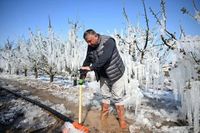Severe weather conditions have wreaked havoc on Turkey's agricultural sector, with record low temperatures causing significant damage across various regions. According to RIA Novosti, temperatures plummeted to as low as minus 15 degrees Celsius, marking the coldest readings for this season in the last 30 years. The Turkish government has acknowledged the critical situation, pledging support to affected farmers as the country grapples with the fallout from this extreme weather.
The Turkish Minister of Agriculture, Ibrahim Yumakli, reported that a sharp cold snap, accompanied by frosts and snowfall, has been observed from March through April, particularly between April 10 and April 12. These adverse weather conditions have led to substantial agricultural losses, reminiscent of the severe frosts experienced in 2014, which devastated many crops. Yumakli emphasized the scale of the current crisis, stating, "These unfavorable weather conditions have led to significant agricultural losses, and the country has faced one of the most massive frosts since 2014."
Farmers across the nation are facing dire circumstances as their crops suffer from the unexpected chill. Reports indicate that apricot and walnut trees, vineyards, and fields of potatoes and onions have all been adversely affected. The Yeni Safak newspaper highlighted that Turkish farmers have begun employing unconventional methods to safeguard their crops from the frost. For instance, one apple farmer installed a sprinkling system to create an ice crust around his plants, which serves to protect them from the biting cold.
The situation is particularly critical in regions like Malatya, where in 2014, a similar frost event led to the destruction of approximately 80% of apricot trees. The memory of that disaster looms large over current efforts, as farmers brace for the potential impacts of this year's weather. The Turkish Ministry of Trade has also taken steps to mitigate the crisis by announcing a ban on lemon exports effective April 8, 2025, to ensure that domestic demand is met and to help compensate for the losses incurred from the frosts.
As the cold spell continues to grip the country, the government is mobilizing resources to assist those affected. Authorities are expected to roll out support measures for farmers who have suffered significant losses due to the harsh weather. The commitment to aid these agricultural producers is crucial, as the backbone of Turkey's economy relies heavily on its agricultural output.
With the ongoing challenges posed by climate change, farmers are increasingly finding themselves at the mercy of unpredictable weather patterns. The recent frost is a stark reminder of the vulnerabilities within the agricultural sector and the pressing need for adaptive strategies to safeguard crops against extreme conditions. As Ibrahim Yumakli pointed out, the country must brace itself for the long-term implications of such weather phenomena, which could redefine agricultural practices in Turkey.
In light of these developments, the Turkish government is not only focusing on immediate relief efforts but is also considering long-term strategies to enhance the resilience of its agricultural sector. This includes investing in technology and infrastructure that can better withstand the impacts of climate change and extreme weather events.
As farmers continue to navigate these challenges, the solidarity and support from both the government and the community will be essential in helping them recover and adapt. The current situation serves as a crucial turning point for Turkey's agricultural industry, highlighting the need for innovation and resilience in the face of adversity.
In conclusion, the recent severe frost in Turkey has underscored the vulnerabilities of the agricultural sector to extreme weather, prompting government action to support affected farmers and rethink strategies for future resilience.


